
Cementing the U.S.-Japan Defense Alliance
The post Cementing the U.S.-Japan Defense Alliance appeared first on Buy It At A Bargain – Deals And Reviews.
The post Cementing the U.S.-Japan Defense Alliance appeared first on Buy It At A Bargain – Deals And Reviews.

68 percent of online activity begins with queries in search engines like Google or Bing.
That’s why keyword research should be the basis of any online marketing campaign.
The goal of keyword research is to find out what your target audience is searching for online and determine what it will take to actually rank in search engines for those keywords.
Without knowing what keywords you should be targeting, how will you effectively optimize your website, target phrases for link building, or know what content to develop for your audience?
In this first section, we’ll go through setting up a spreadsheet for your keyword research and discover the best keywords for both your main website’s search engine optimization and topics for content development.
In the next section, we’ll discuss what data will help you choose the best keywords to target.
The final section will be a compilation of the top posts on keyword research.
Keyword research refers to the process of discovering what search terms your target audience is entering in search engines to find businesses and websites like yours and optimizing your content so you appear in the search engine results.
For example, my target audience for this blog is primarily marketers and small businesses looking for help with their SEO and digital marketing strategies. This means I want pages from my website to appear in the SERPs when my audience searches for terms related to SEO and digital marketing.
Let’s say someone in my target audience is searching for “what is SEO?” I want to make sure I have content on my website that comes up early in the results for that search term. Luckily, I do! Here are some of the top results for the phrase:
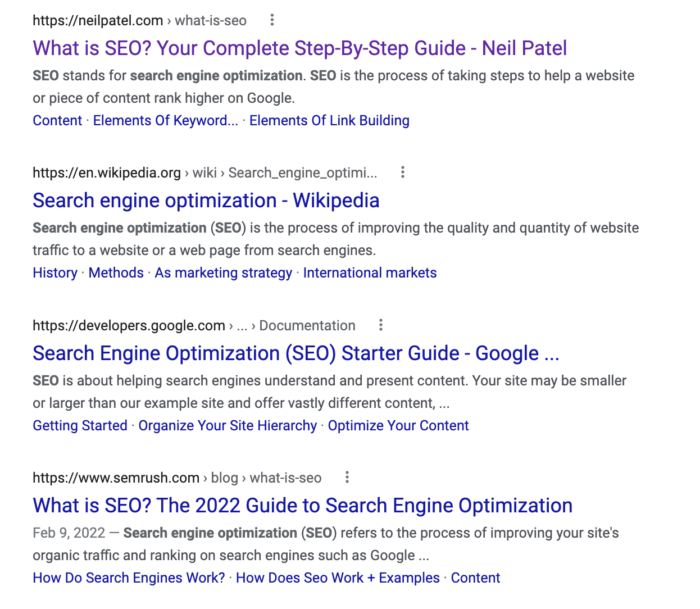
If you want your audience to find your website–whether’s it to your blog, e-commerce website, or for local services like lawn care–you must develop a strategy to help them find you. That’s where keyword research comes in.
The top result in the Google search results for a given search query (aka “keyword”) gets the most traffic 49 percent of the time. The second results get the most traffic 22 percent of the time. By the time you get to the second page of Google, users click on each result less than one percent of the time.
In order to drive your audience to the website, you must identify the keywords they are searching for, and create content that matches their search intent.
There are many methods and tools you can use for keyword research. We’ll outline some of those methods and tools below, so you can pick and choose what works best for you.
The first thing you will want to do is set up a spreadsheet to record your data.
I’ve set up a basic spreadsheet that you can access. This document has columns for data using all tools mentioned in the first two parts of this blog post.
You can add or delete columns as you wish in order to match your keyword research needs. The columns included are as follows.
In this section, we’ll cover filling up the columns with keyword and Google Ads Keyword Tool data.
In the following section, we’ll look at how to narrow down those keywords using the Moz Keyword Analysis tool (or some alternative methods if you are not a Pro member).
If you are signed into your Google account, simply use the File > Save option to save the spreadsheet to your documents and start filling it in with your information.
If you don’t have Google Docs, or would prefer to save it on your local machine, go to the Google Docs version and use the File > Download As to save it as your desired file type. I’d suggest Excel for best possible functionality.
The first phase of keyword research involves coming up with new keyword ideas.
Sometimes this is the most difficult part of the process as many people unfamiliar with keyword competition will select very broad target words such as pizza, hotel, or Los Angeles.
Others will pick obscure phrases that no one will likely search such as SEO/Link Building/Social Media (yes, I’ve seen people trying to similarly over-punctuated phrases).
So the first thing you will need to do is find suitable, related phrases for their business.
You can always start with some simple brainstorming. Look at the main topics on your website and jot down keywords associated with those topics.
I would suggest doing so in Microsoft Excel or another spreadsheet application.
Then, whenever you’re ready to expand on those ideas, continue to some great keyword tools.
The following are a great collection of free and premium tools that will help you discover new keywords related to your website or business.
Ubersuggest is great for helping you discover new keywords.
To get started, simply enter the keyword or phrase in the tool.
Let’s say we’re researching Social Media Marketing.
Input the phrase and click Search.

You’ll get a breakdown that looks like this:
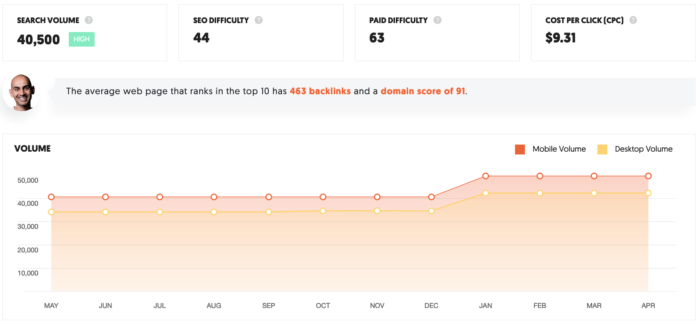
You’re also provided an overview of what it takes, on average, in terms of backlinks and domain score, to reach the first page of Google for the keyword. This is located above a chart displaying the keyword search volume, both for desktop and mobile, over the past 12 months.
You’ll also be able to scroll down and see different variations of your keyword phrase.
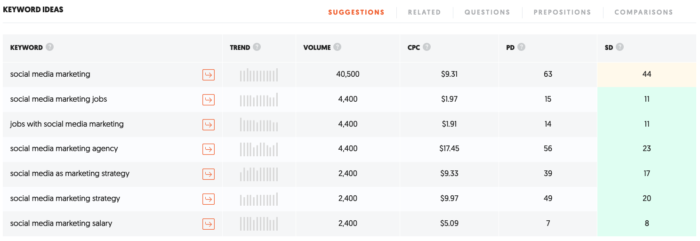
This gives you a wider view of what you can strive to rank for.
For low budgets, you may want to optimize a low competition, low cost per click option that still gets good results. For example, “jobs with social media marketing” fits the mold.
Or, you can pick multiple and A/B test them for the best results.
However you use it, this is a great tool to start with.
Once you have some basic ideas, you can expand upon them by using the five keyword idea variables in Ubersuggest:
In the screenshot above, “suggestions” is highlighted by default. But if you’re searching for the largest list of keywords that contain your phrase, click “Related.”
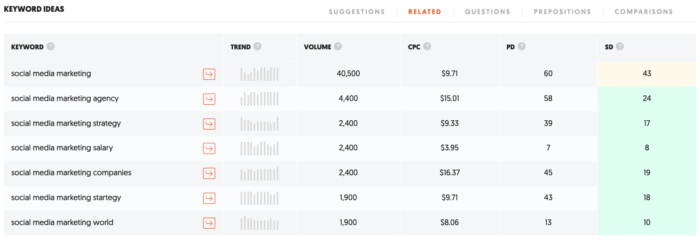
Every keyword on the list now includes your seed keyword, “social media marketing.”
From there, you can experiment with the other search types. Here are some examples of the keyword phrases you’ll uncover for each one:
Looking for alternative suggested search boxes?
The following search engines have similar suggested search options that appear below the search box when you start typing in keywords.
Depending on your keyword, each search engine will offer different suggestions.
Most people stick with Google as it is the most-visited web platform in the world, but it still doesn’t hurt to get additional keyword ideas from elsewhere.
The next tool up is the commonly referenced Google Ads Keyword Planner.
If you have a Google account and, better yet, an Ads account, I would suggest signing in to those once you arrive on the Google Ads Keyword Tool to get better results.
To give you an idea, I searched for social media when I was not logged into my account and received 100 keyword ideas.
I searched for it again when logged in and received more than 600.
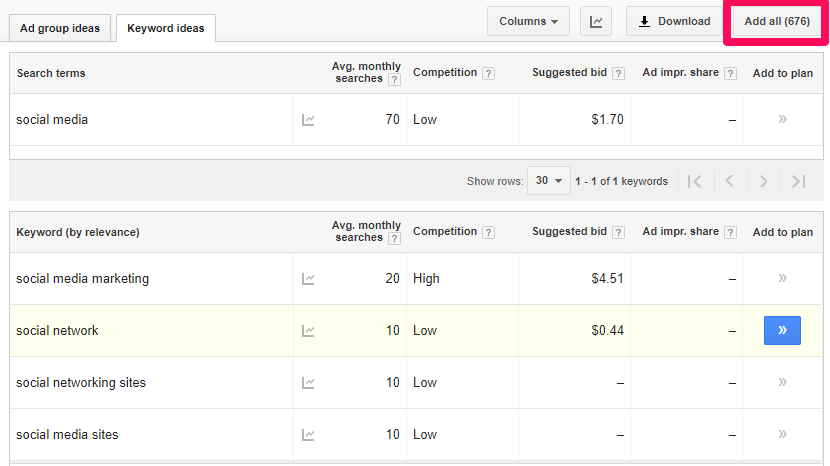
My suggestion is if you are looking for keywords just for your static website and not interested in the cost per click pricing (CPC), go with the results without logging into Google Ads.
If you are interested in the CPC pricing and also getting keyword ideas to help with content development, go with the results while logged into Google Ads.
Here is what each of the columns displayed in the Google Ads Keyword Tool will tell you about each of the keyword ideas displayed.
You can learn more about the search traffic statistics shown in this tool in Google Ads Help.
If you want a simple method to see a broader or narrower range of keywords, you can select this option in the filters on the left side of your screen.
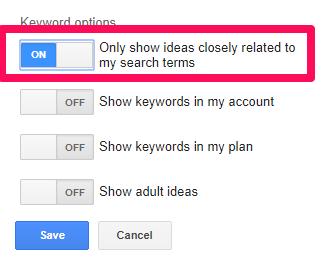
You can also select specific Match Types by clicking the “Modify search” tab and scrolling down to the “Plan your budget and get forecasts” option.
Inputting your search term with the added punctuation will change the traffic volume for Global and Local Monthly Searches based on the approximation of traffic that a keyword gets on Google.
You can learn more about match types (and some additional ones not on this list) in Ads Help.
You can also see the difference in data based on the three match types using the phrase social media in order of broad, “phrase,” and [exact].

And if you were to use these match types in a search, you would get 419 million results for a broad match search for social media and only 304 million results for a phrase match search for “social media.”
Going back to the generic term social media, you might want to remove certain words from the keyword ideas.
For example, you may not want to target anything about social media jobs, so you could add the word job under the Negative Keywords tab on the left side of the screen.
Now, you’ll need to export your data.
To do so, simply use the Download button under the Review Plan tab and export to your preferred format.
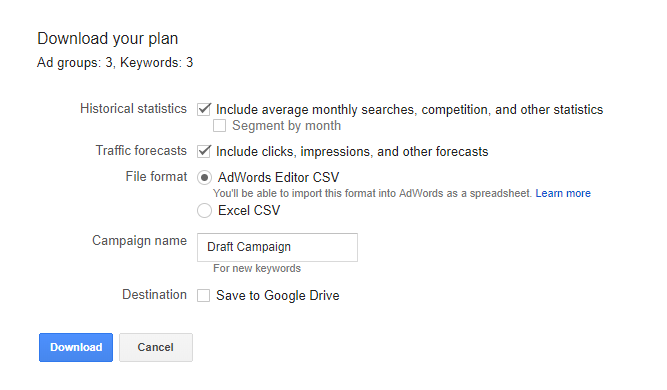
You can then copy the data from the exported spreadsheet to your keyword research spreadsheet.
You can also get this data for the keyword ideas you generated using SEMrush and suggested search by copying and pasting those keywords into the Word or phrase box and checking the box to only show ideas closely related to my search terms.
Then export the data for those keywords and phrases by checking the boxes next to them under the Search Terms section.
At this point, you probably have a lot of great keyword ideas.
In the next section, I will cover how to use the Moz Keyword Analysis Tool (or an alternative method to get the same information if you are not a Pro member) to get additional data and then narrow down your keywords to the ones that you should most likely focus upon for your online marketing strategy.
Now that you have a base spreadsheet to use for keyword data entry, let’s look at what’s next.
I want to show you some ways to get even more data about each keyword and further narrow down your results.
Please note that this data will take a bit of time to compile, so you might want to run through the keyword list and remove any obvious ones that you don’t want.
I usually go with no more than 100 keywords for this part of the process.
Ubersuggest is a great tool for analyzing which keywords to use and what websites to examine for ideas.
For example, when we search for social media marketing in Ubersuggest, you can see a list of “content ideas”:
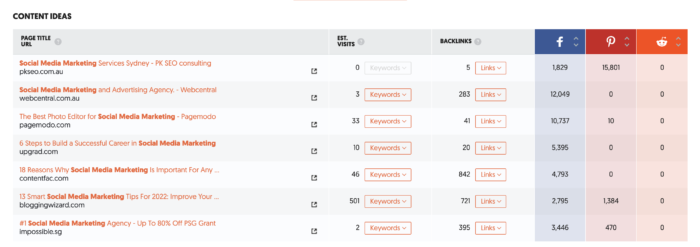
As you can see, a list of pages that rank for the keyword “social media marketing” appears. You can also see how many visits the page gets from the keyword, how many backlinks the page has, and how many shares it has on Facebook, Pinterest, and Reddit.
You can poke around the most successful websites and use that as a jumping-off point for what to include on your own page to rank for the keyword.
You can get other important data to help you narrow down your target keywords with Moz.
If you have a Pro membership with Moz (you can always get a 30-day free trial if you have just one keyword research project to do), then you have access to a very nice little tool called Keyword Difficulty & SERP Analysis.
This tool will show you the percentage of difficulty for each keyword, giving you an idea of how hard it will be to rank highly for it.
You will also see the top ten sites ranked for each keyword, each listed with its domain authority and the number of root domains linking to it.
The latter is really the information that will help you decide which keywords to target.
You can put in five words at a time, and you can now pick between keyword, root domain, subdomain, or page.

Using our keyword phrase “social media management,” you can see the results of the difficulty assessment, search volume, organic click-through rates, and the balance of ranking ease and end results (Priority).

While this information is helpful, it’s not really anything we don’t already know. We’ve already decided we like this keyword phrase.
If anything, this is just a double-check that confirms the basics you found in the Ads Keyword Tool.
Below this information, you’ll find more keyword suggestions and a SERP analysis of the keyword.
The suggestions are fine for more brainstorming, but we’ll come back to the SERP analysis. That’s the real goldmine.
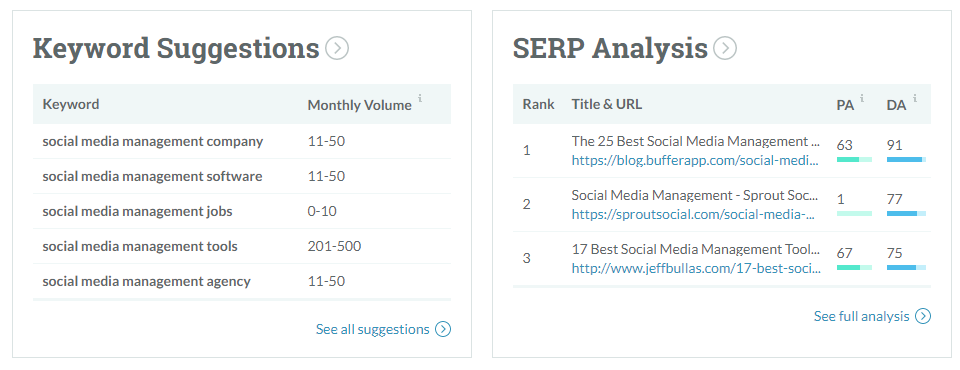
You can also find a short list of mentions for your keyword at the bottom of the page.
This is useful in letting you know who is using the keyword and how recently they created content with it.
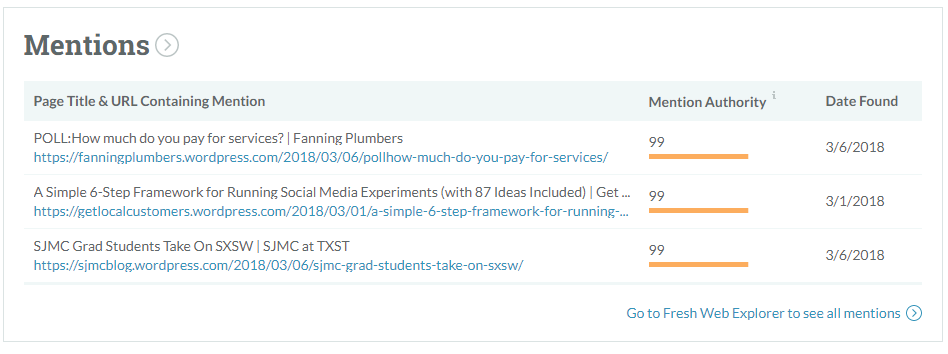
While this information is nice, the real competitor information can be seen when you click on the SERP full analysis for each keyword, such as these results for a social media company.
I like to open them in new tabs for convenience.
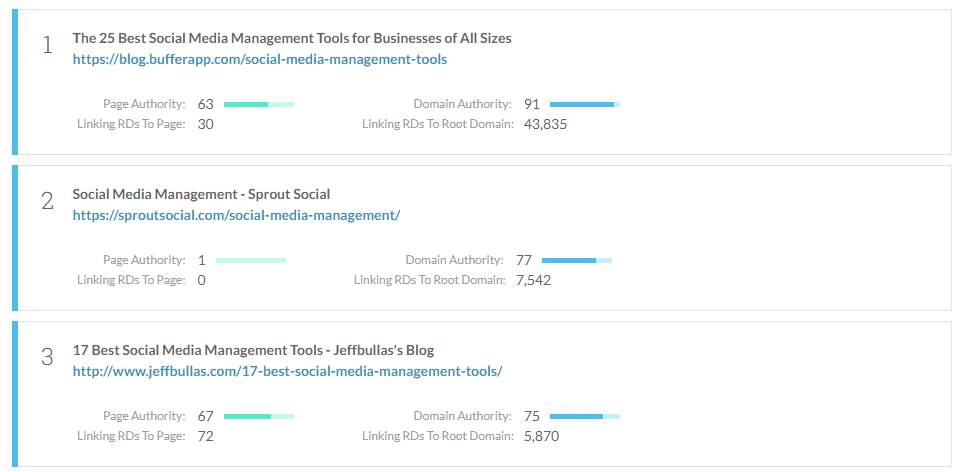
This is the part where you can learn a few things.
First off, you can see who you will be trying to beat.
If your website comes up in this list of the top ten, then congratulations – you’re on the first page for a keyword phrase with a highly competitive keyword difficulty of 61%.
If you’re not in these results, you can compare your own website’s domain authority and linking root domains to the stats of the sites ranking in the top ten.
Domain authority is a score from 1 to 100. The higher a website’s domain authority, the more likely it is to rank for the keywords it is optimized for.
The linking root domains is the number of unique domains linking to a website.
You can see that the site with the highest authority and linking root domains doesn’t necessarily win the top spot.
But if you want to make #1, your site may need a domain authority of 28 or higher and hundreds of linking root domains to beat the competition.
Another thing you can learn from this is whether a keyword is drawing commercial or informational results.
This means that you will learn whether your keyword is being searched for commercial purposes (meaning that someone wants to find a product or service) or whether it is being searched for informational purposes (meaning that people are looking for information, not a product or service).
For social media company, the results include seven actual social media consulting companies and agencies.
Comparatively, if I do a full analysis of the keyword phrase “what is social media” you will see that the first page of results is purely informational. All of the results are from highly authoritative domains.
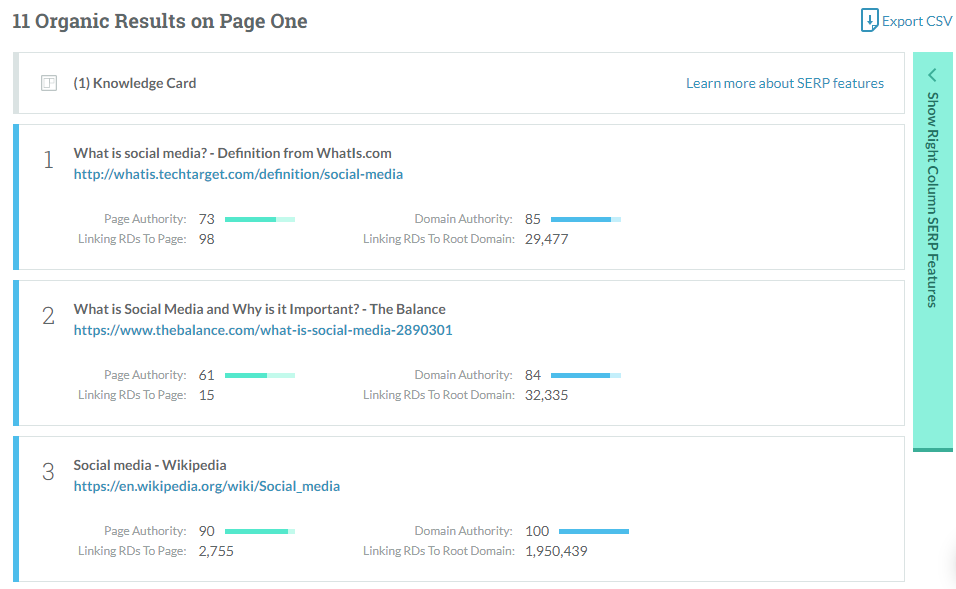
So if you are a social media company, you will probably want to target the phrase social media companies for your main business homepage.
You will also want to create some content based around the phrase what is social media and place it on highly authoritative domains such as YouTube and SlideShare to see if you can get it into the rankings for a phrase searched potentially by a million people monthly.
If you’re not interested in a premium tool, then you can simply look up each keyword and look at websites ranking on the first page of the results.
If you’re interested in the domain authority stats, you can get some using another Moz tool called Open Site Explorer. You’ll get a limited amount of stats for free accounts though.
Or, you can use the free version of the SEOmoz toolbar – just use that and compare it to your own website’s domain authority.
At least with this information, you can still determine the commercial vs. informational usage of a keyword plus some basic stats to compare against your own website.
The final part of the process is taking the spreadsheet and interpreting the data.
I like to use the Conditional Formatting in Excel to highlight cells a certain color based on the numerical value in the cell.
You simply highlight the cell range you want to compare, then go to Conditional Formatting > New Rule.

Select the 3-Color Scale Format Style, and change the Lowest Value / Highest Value color when applicable.
Certain fields in your spreadsheet will need to display the fact that a higher number is good whereas a lower number is bad.
For those fields (global & local monthly searches), you will want to leave the color settings as default, as shown below.
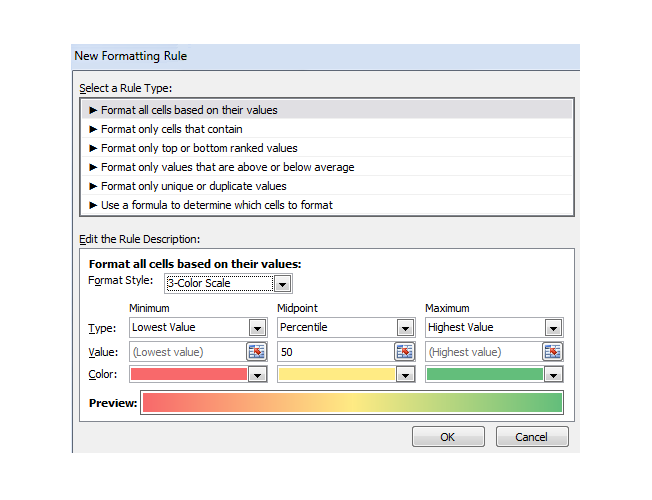
Other fields in your spreadsheet will need to display the fact that a higher number is bad whereas a lower number is good.
For those fields (GAKT – Competition, GAKT – Approximate CPC, SEOmoz KA – Difficulty, SEOmoz KA – Competitor DA, SEOmoz KA – Competitor RDLRD), you will want to change the lowest value color setting to green and the highest value color setting to red, as shown below.
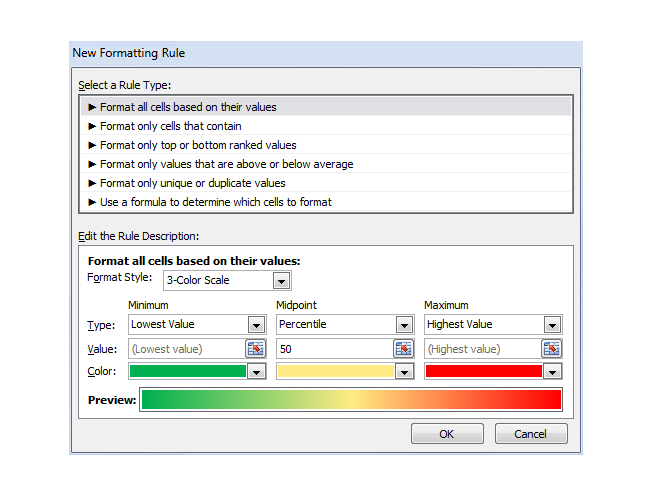
Once you’re finished, you can highlight the top row and add a filter by applying the Sort & Filter > Filter option.
I like to start with selecting the filter for the SEOmoz KA – Difficulty column and sorting it from smallest to largest.
This way you get the following (click on the image below to see a larger view):

As you can imagine, having the highlighting and sorting options would be very valuable when looking at a spreadsheet with up to 100 keywords.
You could quickly see which keywords have the most searches and least competition or the least competition but most searches.
You could then move over and look at the actual competition for each keyword if you were shooting for #1 rankings.
My suggestion when making the final choice of keywords is as follows:
Sometimes, it’s not the actual decision that is the most difficult – it is actually compiling the data that takes the most time! Also, don’t forget to take the keywords that are more informational and use them for content topic ideas!
This concludes our method of discovering keyword ideas, analyzing them, and then choosing the best for your website.
We have noticed that there are many various ways to perform keyword research, and you have to try out different analysis methods to see which ones speak to you the best when deciding on keywords.
Think about the topics related to your industry or business that your audience is likely to search on the Internet. Use a tool like Ubersuggest to find and select the best keywords for those topics.
Tools like Ubersuggest and Moz have free versions of keyword tools you can use, though you will unlock additional data and features when you select a paid version.
You should do keyword research for your organic and your paid marketing.
SEO is the process of optimizing your website to rank in the search results for specific terms related to your business.
{
“@context”: “https://schema.org”,
“@type”: “FAQPage”,
“mainEntity”: [
{
“@type”: “Question”,
“name”: “How do I know what keywords to target for my website?”,
“acceptedAnswer”: {
“@type”: “Answer”,
“text”: ”
Think about the topics related to your industry or business that your audience is likely to search on the Internet. Use a tool like Ubersuggest to find and select the best keywords for those topics.
”
}
}
, {
“@type”: “Question”,
“name”: “Are there free keyword research tools?”,
“acceptedAnswer”: {
“@type”: “Answer”,
“text”: ”
Tools like Ubersuggest and Moz have free versions of keyword tools you can use, though you will unlock additional data and features when you select a paid version.
”
}
}
, {
“@type”: “Question”,
“name”: “Should you do keyword research for paid campaigns?”,
“acceptedAnswer”: {
“@type”: “Answer”,
“text”: ”
You should do keyword research for your organic and your paid marketing.
”
}
}
, {
“@type”: “Question”,
“name”: “How does keyword research relate to SEO?”,
“acceptedAnswer”: {
“@type”: “Answer”,
“text”: ”
SEO is the process of optimizing your website to rank in the search results for specific terms related to your business.
”
}
}
]
}
Completing thorough keyword research is crucial if you want to drive traffic to your website.
There are many keyword research methods to try in addition to those I outlined in this post. As you get more experienced with keyword research, you may want to try out some additional methods.
There are also a plethora of keyword research tools at your disposal. My favorite (biased though I may be) is Ubersuggest. Our team is continually rolling out new features to provide you with better data that other tools don’t provide.
If you don’t want to do your own keyword research, SEO, or digital marketing, you can reach out to my agency for help.
What is your favorite method of keyword research?
What are your favorite keyword research tools?
The Indian driver is aiming for the title in his third season in Formula 2
The post Daruvala joins champs Prema for 2022 F2 season appeared first on Buy It At A Bargain – Deals And Reviews.
Location: India
Remote: Yes
Willing to relocate: Yes
Technologies: Java + Spring Framework stack, Typescript, Angular, Postgres, Neo4j, Cypher, GraphQL, JUnit, Mockito, jMeter, Prometheus, Docker, Kubernetes, Scrum, Kanban, TDD, CI/CD, Azure Fundamentals
Resume/CV: https://drive.google.com/file/d/1u1vm4hbHbhJuoTKK7laSSX3mO6z1dRRX/view?usp=sharing
Email: akashsorthiya@gmail.com
Hi there! My name’s Aakash and I’m a backend/fullstack engineer with a strong interest in open source or startup projects. I have 1+ years of experience as a software engineer. I’m seeking a full time role and I prefer to work on Java but I’m open to all opportunities and learning a new tech stack.
Please reach out if I seem like a good fit for your team!
Article URL: http://careers.tryindex.com
Comments URL: https://news.ycombinator.com/item?id=24939830
Points: 1
# Comments: 0
Article URL: https://docs.google.com/document/d/1BrJ3U4_D6_FxMYnaxZ4-NfCL8KuFGbvYjwh7ReF39zI/edit#
Comments URL: https://news.ycombinator.com/item?id=24787646
Points: 1
# Comments: 0
Article URL: https://lowkey.gg Comments URL: https://news.ycombinator.com/item?id=23973632 Points: 1 # Comments: 0
Are you looking for crowdfunding resources? You’ve come to the right place. There are videos, books, articles, blogs, and even special tools to help you run the most successful campaign possible.
Of course, some of the information these resources offer will not be as useful to you as others. It all depends on your unique needs and situation. Do take the time to browse them all, even those that are written specifically for a platform you do not intend to use. You may be surprised at what you can learn and what advice can cross over.
Be aware too, that each platform has its own set of rules. Do not neglect to read the regulations and FAQs for whichever platform you choose to go forward with.
Keep your business protected with our professional business credit monitoring.
Regardless of how many crowdfunding resources you find or how successful your campaign is, you will still need to build fundability for your business. Crowdfunding won’t work forever, and you need to be sure you have every funding option possible available to you. The best way to do that is to ensure your business is as fundable as possible.
In truth, fundability is much more important than building the perfect crowdfunding campaign. That doesn’t mean you should give up on crowdfunding, but you definitely can’t rely on it. It may work, but it may not. So, building fundability will ensure you have access to the funding you need throughout the life of your business.
Crowdfunding sites allow you to inform thousands of micro investors about your business or business idea. Anyone who wants to can invest as much or as little as they want.
Investors pledge a broad range of amounts depending on the campaign and the platform in use. They may give $50, they may give $150, or they may give over $500. Pledges can even go as low as $5.
Though not always necessary, most offer rewards to investors for their giving. Typically, this comes in the form of the product the business will be selling. Different levels of giving result in different rewards. For example, a $50 gift may get you one incentive, and a $100 gift will get you an upgraded version of that incentive, or something different all together.
There are many crowdfunding sites, but the most popular are Kickstarter and Indiegogo. Many crowdfunding resources are geared toward aiding in success on these two platforms. Much of the advice these resources offer is useful on any crowdfunding campaign, but some is specifically useful on one of these two.
The platforms are similar, but there are some very large differences. The most obvious is when you actually get the funds you raise.
For example, with Kickstarter you have to reach your preset goal before you can receive the funds. If you set a goal to raise $12,000, investments have to reach that amount before you get your hands on any of the money.
Indiegogo on the other hand lets you choose if you want to receive funds as they come in or wait until you reach your goal. In addition, they have the option for InDemand, which lets you continue to raise funds after your initial campaign is over. There is no need to start a new campaign.
Indiegogo also has a flexible funding option for those who may need it.
To make the choice for yourself, you need to figure out who your audience is, and which platform will best reach them.
The internet is full of advice and tools to help you fund a fabulous crowdfunding campaign. We’ve gathered some of them here in one place so you can get the best start possible.
Keep your business protected with our professional business credit monitoring.
Like I said, you’ll find many crowdfunding resources are geared toward help on a specific platform. Remember though, don’t underestimate a resource that is not geared toward your platform. Certain aspects can be helpful regardless of the platform you use.
Here are some great crowdfunding resources to help with success on Kickstarter.
Here are some crowdfunding resources geared toward Indiegogo users.
These crowdfunding resources are geared toward specific platforms other than Kickstarter and Indiegogo.
These resources are not directed toward success on any specific crowdfunding platform. Rather they can offer inspiration and direction on techniques and circumstances that should work regardless of the platform you choose.
These video crowdfunding resources may be useful.
The following crowdfunding resources do not really fit into another category so we are calling them miscellaneous.
Crowdfunding is a great option, but the cold hard fact is that it rarely works. There are far more campaigns that fail than see success. Even those that are successful often end up not raising enough funds. Then, entrepreneurs end up needing to seek out funds from other sources.
These other sources may include loans, invoice financing, and lines of credit. Of course, grants are an option too. However, they are few and far between. Furthermore, competition for grants is fierce. That leaves the financing options, and to be eligible for those, your business has to be fundable.
Fundability if the ability of your business to get funding. It is affected by many things. Business credit is a huge piece, as is personal credit. However, it is impossible to have fundability regardless of your credit, if your business is not properly set up to be fundable.
Keep your business protected with our professional business credit monitoring.
LIke I said, setting up your business to be fundable is not the only piece of the fundability puzzle. However, it is the first piece that has to be placed and the biggest piece missed by most business owners. Here is where you start.
The first step in setting up a business to be fundable is to ensure it has its own phone number, fax number, and address. You can still run your business from your home or on your computer if that is what you want.
In fact, you can get a business phone number and fax number that will function over the internet rather than phone lines. Also, the phone number will forward to any phone you want it to so you can simply use your personal cell phone or landline if you want.
In addition, you can use a virtual office for a business address. This is a business that offers a physical address for a fee. Sometimes they even offer mail service and live receptionist services. Even better, there are some that offer meeting spaces for those times you may need to meet a client or customer in person.
The next thing you need to do is get an EIN for your business. This is an identifying number for your business that works in a way similar to how your SSN works for you personally. You can get one for free from the IRS.
Incorporating your business as an LLC, S-corp, or corporation is necessary to fundability. This helps show your business is legitimate, and it gives some protection from liability.
It does not matter which option you choose when it comes to fundability. It does matter for your budget and needs for liability protection. The best bet is to talk to your attorney or a tax professional. Keep in mind, when you incorporate, you become a new entity. Basically, you have to start over. You’ll also lose any positive payment history you may have accumulated.
As a result, you have to incorporate as soon as possible. Time in business is important to fundability as well. The longer you have been in business the more fundable you appear to be. That starts on the date of incorporation, regardless of when you actually started doing business.
You need a separate, dedicated business bank account. Here’s why. First, it will help you keep business finances separate from personal ones. This is important for tax purposes.
But wait, there’s more. You can’t get some types of funding without a business bank account. Many lenders and credit cards want to see a minimum average balance. In addition, you cannot get a merchant account without a business account at a bank. That means you can’t take credit card payments. Generally, consumers spend more when they can pay by credit card.
For a business to be legitimate, it has to have all of the licenses it needs to run. Conversely, if it doesn’t, it will not appear to be a legitimate business. Do the research you need to do to make sure you have all of the licenses you need to legitimately run your business at the federal, state, and local levels.
How can a business website affect your ability to get funding? In today’s world, you do not exist if you do not have a website. However, a poorly put together website can be even worse. It is the first impression you make on most. If it appears to be unprofessional, it will not look good for you with consumers or potential lenders.
Even more to the point, if potential investors from a crowdfunding site check out your website and it stinks, they will not donate.
Do what you have to to make sure your website is professionally designed and works well. Also, don’t use a free hosting service. Don’t forget, your business needs a dedicated business email address. Make sure it has the same URL as your Website. Don’t use a free service such as Yahoo or Gmail.
What’s the take away? First, crowdfunding is a legitimate option, and these 46 crowdfunding resources can help you on your road to success. Next, you have to have a backup plan. You have to know you can get funding if crowdfunding doesn’t work out. Fundability is your backup plan. There are a lot of things that affect fundability, but none of it matters if your business isn’t set up to be fundable in the first place. There are several things you have to do to set up your business to build fundability.
If your business is fundable, you will be able to access pretty much any funding you need now and into the future. You won’t have to worry about the ability to qualify for a loan, line of credit, or any other type of financing. This will help ensure your business can run and grow for as long as you want.
The post 46 Crowdfunding Resources Available to Help You Run Your Campaign appeared first on Credit Suite.
Article URL: https://boards.greenhouse.io/logdna/jobs/4703358002
Comments URL: https://news.ycombinator.com/item?id=22809710
Points: 1
# Comments: 0
No Faxing Cash Advance Loans– Understanding Late Fees And Interest Rates
Cash loan lendings obtain cash in your hands in an issue of hrs for those monetary emergency situations. Without any faxing of papers, the application procedure takes much less than 5 mins. As well as without credit score check, authorizations occur in no time at all.
To discover the most effective offer on a cash advance, recognize late costs as well as rate of interest. Ask regarding them prior to authorizing up with a lending institution.
Exactly How Cash Advance Companies Charge Their Fees
Cash loan car loans are made for an issue of weeks, so lending institutions bill a level cost instead of a rates of interest. The majority of lending institutions upload their charges as a lot to obtain a hundred bucks. Typically, funding costs have to do with 15% or $15 for each $100 obtained.
If you can not pay back the funding, after that simply the funding cost is due. For an additional funding cost, your lending term can be expanded.
The Trap Of Late Fees
If there are no funds readily available, you will certainly be billed a huge late charge. It is really simple to rack up over a hundred bucks in late charges.
You will not be able to obtain a cash advance car loan if you have exceptional checks. Cash money breakthrough business are ready to renegotiate your finance terms prior to they are late. Prior to your settlement schedules, make setups with your lending institution if you lack funds.
And afterwards There Are Interest Rates
The majority of payday advance loan lending institutions upload a rates of interest in conformity with government legislation. This price is the APR, or what the finance would certainly set you back for a whole year. While this number can aid you make contrasts in between various sorts of credit ratings, it isn’t the level charge number for a 2 week car loan.
APR prices, funding costs, as well as late fees differ with various loan providers. You can conserve on your own cash by investigating costs. Lenders need to reveal funding prices prior to you authorize an agreement, so request them prior to using.
Money development finances are created for an issue of weeks, so lending institutions bill a level charge instead than a passion price. If you can not settle the funding, after that simply the funding cost is due. For an additional funding cost, your funding term can be prolonged. While this number can assist you make contrasts in between various kinds of credit histories, it isn’t the level cost number for a 2 week lending.
APR prices, funding charges, as well as late fees differ with various loan providers.
The post No Faxing Cash Advance Loans– Understanding Late Fees And Interest Rates appeared first on ROI Credit Builders.